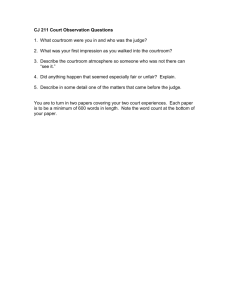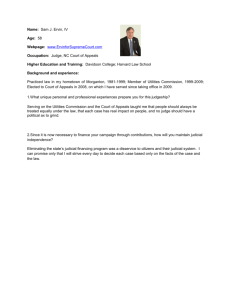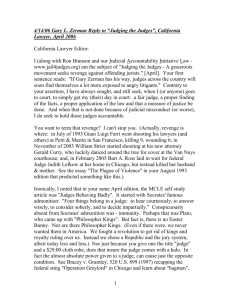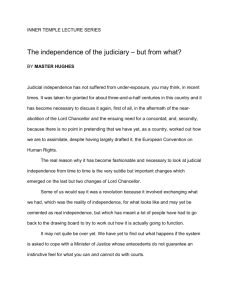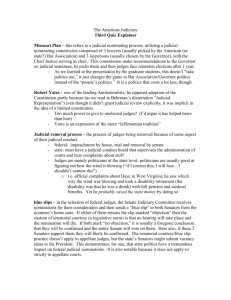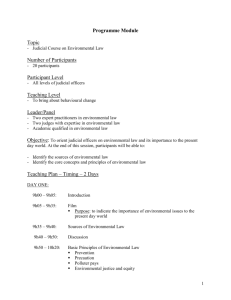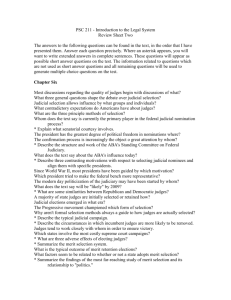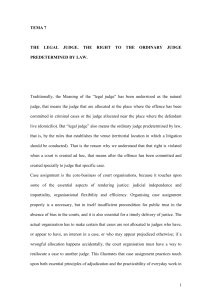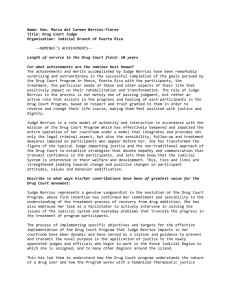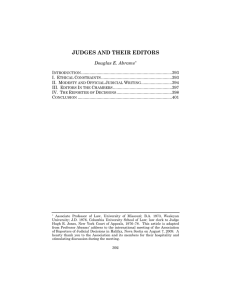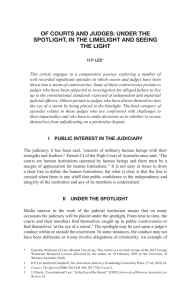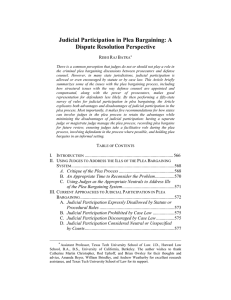File - Maryland Highway Safety Judicial Conference
advertisement
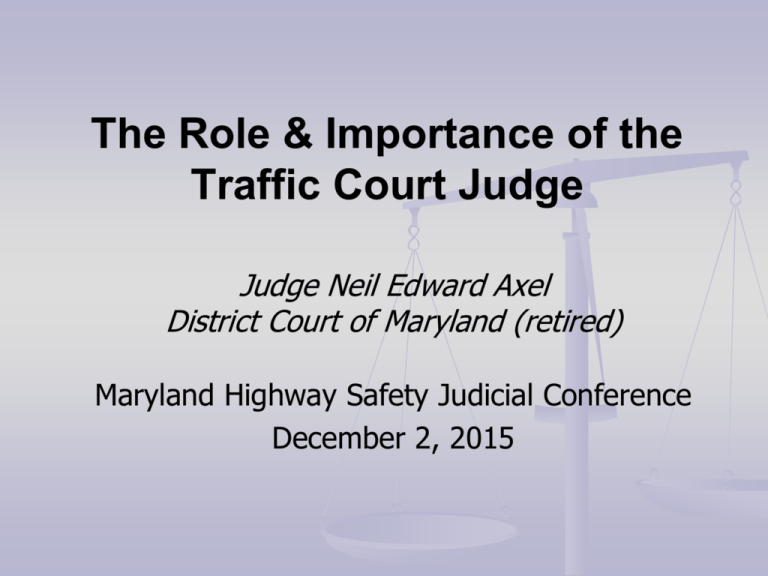
The Role & Importance of the Traffic Court Judge Judge Neil Edward Axel District Court of Maryland (retired) Maryland Highway Safety Judicial Conference December 2, 2015 “The traffic court has . . . suffered from the failure of judges, legislators and lawyers to realize that its work involved new problems of judicial administration that were quite different from those of the ordinary criminal courts.” Arthur T. Vanderbilt, Dean of the NYU School of Law (1942) 2 Areas of Judicial Influence Inside the Courtroom Pretrial release Plea agreements Sentencing Outside the courtroom Working with other stakeholders Coordinating Councils & Task Forces 3 As judges we play a role in . . . Moving/managing dockets Deciding cases Holding offenders accountable Effecting behavioral changes Protecting communities Reducing recidivism Educating offenders Educating communities Creating problem solving courts Providing insights to study groups & task forces Judging: One Challenge Maintaining judicial function without yielding to pressures of: Docket size Time standards Administrative functions Chambers work Non-judicial time 5 NHTSA’s Four “E”s of Traffic Safety: A Partnership of Stakeholders Enforcement Engineering Education Emergency response 6 Challenges & Obstacles in Traffic Court Heavy caseloads Plea agreements Incomplete information Lack of system coordination Lack of financial resources Variations in alcohol assessments & treatment Inadequate post-sentence supervision 7 Bail Review Hypothetical Defendant appears for bail review: 28 years old; life-long resident of MD Charged with DUI (BAC – 0.19) & DWR Currently on probation for DUI #2 Prior DUI’s – 2010 and 2014 Gainfully employed; lives with spouse + children No prior FTAs 8 Montana’s 24/7 Sobriety Program As condition of bail or sentence, defendants required to submit to twice-a-day, random or continuous alcohol monitoring Judge Mary Jane Knisely, Montana District Court: “as a pretrial tool, the program strikes a necessary balance between a judge’s statutory duty to protect the safety of the community and an offender’s right to the least restrictive form or supervision.” “as a sentencing took, it gives alcohol-dependant defendants a jumpstart on sobriety” Constitutional: State v. Spady, 380 Mont. 179 (2015) 9 Plea Agreements Prosecutor announces plea agreement reducing DUI to negligent driving because officer is not present Can/should judge accept plea? Whose decision is it? Role of judge – don’t ask; don’t tell? 10 Baseless Pleas: A Mockery of Justice 78 Fordham L.Rev. 2961 (May 2010) “Prosecutors and judges cannot participate in baseless pleas because the practice defies their ethical responsibilities to uphold the integrity of the court and legal profession and to ensure the fairness of the criminal process.” Undermines integrity Diminishes respect for the court Subverts the fairness of criminal proceedings 11 Iowa Supreme Court Attorney Disciplinary Bd. v. Howe, 706 N.W.2d 360 (2005) Prosecutor disciplined for reducing moving violations to equipment violations that were not supported by probable cause HELD: conduct violated RPC for: advancing claims that were unwarranted making false statements of law or fact Not a defense that judge approved the amended charge 12 Sentencing 13 Discussion Questions 1. Do judges protect the community most by: 2. Incarceration? Probation? or Changing behavior? To what extent does jail change behavior? 14 Sentencing "Every judge understands that with more information about an offender's circumstances, a sentence can be better tailored to the person to ensure he or she doesn't repeat the offense." One size does not fit all David Wallace, Highway to Justice, at p. 5-6 (a publication of the American Bar Association, Summer 2015). Outside the Courtroom 16 Judicial Role Outside of the Courtroom Interaction with other community stakeholders to discuss disposition of DUI cases Participation on Task Force or Coordinating Council Improvement of the law, the legal system or the administration of justice = OK BUT must not impede upon appearance of impropriety 17 Code of Judicial Conduct Rule 3.1. Extrajudicial Activities in General A judge may engage in extrajudicial activities unless it: will interfere with proper performance of judicial duties will lead to frequent disqualifications will appear to a reasonable person to undermine one’s independence, integrity or impartiality 18 Code of Judicial Conduct Rule 3.1 Comments “Judges are uniquely qualified to engage in extrajudicial activities that concern the law, the legal system, and the administration of justice.” Extrajudicial activities help integrate judges into their communities Furthers public understanding and respect for the courts 19 Our Role as Traffic Court Judges? Concluding Thoughts To stop, from time to time, & question what is going on To ensure we have the information needed to make good informed decisions To hold offenders accountable To think outside the box and improve outcomes 20 Comments? Questions? 21
